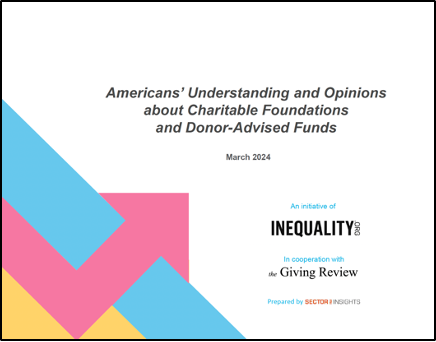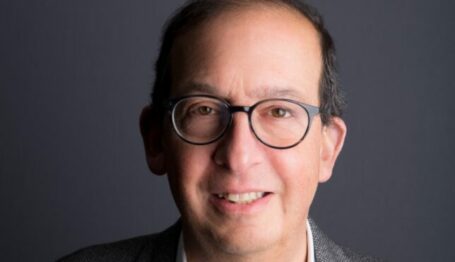Philanthropy
Concern About and Willingness to Reform Philanthropy Is Cross-Ideological, Survey Finds
According to an Ipsos poll commissioned by Inequality.org in cooperation with The Giving Review, most Americans are unaware of details about philanthropy. When presented with specific statements describing policy concepts and ideas, though, many reform ideas are supported by a solid majority, both on the left and right.


As we and colleagues at Inequality.org have recently been getting “together to discuss what’s gone awry in the current state of charitable giving and the incentives our tax system provides to donors, we learned something quite remarkable: we were in near complete agreement about that which should concern the nonprofit sector and policymakers,” as Chuck Collins and I describe in the preface to Americans’ Understanding and Opinions about Charitable Foundations and Donor-Advised Funds, a major survey conducted by Ipsos and released today.
We and our conversational counterparts across the ideological spectrum cooperated in the project “to see whether our own experience reflects public opinion more broadly—and the results suggest that it does,” the preface continues.
The online poll of just more than 1,000 measures Americans’ understanding and opinions about charitable foundations and donor-advised funds. Its results generally show that most Americans are unaware of the details of how private foundations and donors-advised funds (DAFs) work, the scale of the nonprofit sector, or the way current tax incentives benefit wealthy donors who create private foundations and open accounts with DAF providers.
When presented with specific statements describing policy concepts and ideas, though, many reform ideas are supported by a solid majority of respondents. Overall, for example, 83% of respondents strongly or somewhat agree that taxpayers “should not have to subsidize billionaires and other wealthy Americans who wish to create permanent legacy foundations that will exist in perpetuity to give donations to charities of their choosing.” Among those who identify themselves as on the left (“liberal/Democrat” or “very left”), 87% agree, and on the right (“conservative/Republican” or “very right”), 78% agree.
Overall, 75% percent strongly or somewhat agree that there “should be a limit or maximum amount that ultra-wealthy donors can claim for donation tax credits to reduce their taxes. This could be a lifetime maximum (accumulated over the years) or perhaps an annual cap for each income tax year.” Among those who identify themselves as on the left, 86% agree, and on the right, a lower 66% agree.
Seventy-one percent of all respondents strongly or somewhat agree that “Congress should raise required foundation payout from 5 percent of assets to 10 percent annually—and require that donor-advised funds have a 10 percent payout to active charities—even if this reduces the overall amount of money in these foundations and DAFs in the future.” Among those on the left, 81% agree, and on the right, 69% agree.
Overall, 83% strongly or somewhat agree that in exchange for the tax incentives that wealthy donors receive, “they should be required to report the large contributions due to the influence such large donations may have on the nonprofits.” On the left, 92% agree; on the right, 74% agree.
Asked whether they agree or disagree with the concept that “[w]ealthy donors should be allowed to make large donations, anonymously, without the nonprofit having to report where their big gifts are coming from”—with no mention of “influence” in the description of the idea, as with the one about required reporting—58% of respondents said they strongly or somewhat agree with allowed anonymity, and 42% said they strongly or somewhat disagree. On the left, 48% agree; on the right, a higher 68% agree.
This article first appeared in the Giving Review on March 13, 2024.



